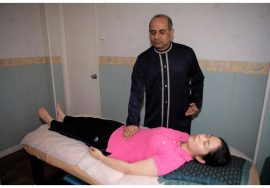
DRINK YOUR SOLIDS, EAT YOUR LIQUIDS
Ayurveda says that there are 3 main pillars which sustain our body structure and maintain our health – Vata (combination of Air and Space elements); Pitta (combination of Fire, Air and Water elements); and Kapha (combination of Water and Earth elements).
Similarly, there are 3 sub-pillars, namely Food, Sleep and Celibacy, which are also very important for sustaining our health.
In this blog, we share some valuable information pertaining to “Food”.
Since Ayurveda is a very deep and sublime science, it does not talk about “food” only at the gross level, but it also talks about “food” at a very subtle level. Hence, according to Ayurveda, food is not limited to what we consume orally through our mouth, rather, it also includes any sense object which we use to satisfy the need of any of the senses, through the relevant sense organ, e.g. listening to good, soothing music is food for the sense of hearing, consumed through the ears; and enjoying good fragrance is food for the sense of smell, experienced through the nose.
In this blog, we will mainly focus on the “Food” which we consume through the mouth.
Ayurveda says, one should be mindful about the 5 main points before and while eating his food, which are as follows:
- Why to eat?
General understanding is that we eat for gaining energy. Ayurveda elaborates this point in a very logical way – it says that we need to eat different types of food to derive 7 dhatus (tissues/components) which help us to sustain our body structure and maintain our health. These 7 sustainers are, Plasma, Blood, Muscles, Fat, Bones, Marrow (a connecting tissue, like bone marrow), and the reproductive tissue – for men it is semen (sperms) and for women it is ova (eggs). When we eat a balanced diet, our body’s digestive system processes it nicely and transforms it into the above 7 tissues. If the 7 tissues are produced in the required proportion and are of good quality, then our health and immune system can be reasonably good, with strong resistance power, which can protect us from falling sick.
- What to eat?
This is a very significant point. Most of us, if not all of us, actually do not know what we should eat to be healthy!
General saying is – we are what we eat. Ayurveda adds further to this saying – we should eat what we are; meaning we should eat according to our “Prakruti” (constitution). And it also says – we are what we actually digest.
In Ayurvedic texts, it is mentioned that the main cause of sickness is that most people do not know who they are! Yes, most of us are unaware about our own “Prakrauti” (constitution). We know that each country has its own constitution and all the laws, policies, etc. are drafted based on the constitution of the country.
Similarly, the body also has its own constitution and all the systems work within the body according to that particular/specific unique constitution that nature has created us with. If we eat and live according to our own unique individual constitution, this will help us to maintain good health and live happily. Unfortunately, most of us are ignorant about this simple point – what is our constitution.
Due to this, we do not know what kind of food is suitable for us and what food is not appropriate for us. Therefore, we end up eating food unsuitable for us and following a lifestyle that is inappropriate for us. To a certain extent, the body’s inbuilt mechanism helps us to tolerate our wrong eating habits and inappropriate lifestyle. But if we frequently keep eating the wrong food over long periods of time, then the body’s inbuilt resistance power becomes over-burdened, and as a result of this we fall sick.
Secondly, Ayurveda says, we are what we digest. Nature has provided us intelligence at our overall individual level and also at the micro level, e.g. each system and each cell has its own intelligence. When there is proper co-ordination and harmony amongst the micro and macro levels, we can be healthy and more balanced. As soon as there is some lack of co-ordination and co-operation between different systems and our overall intelligence, there is a risk of us falling ill.
For maintaining a proper link between different systems and our personal intelligence, it is imperative that we eat right and live right, as per our constitution, so that the food we consume is properly processed and transformed into the seven sustainers. Otherwise, food which is not digested well, turns into “Ama” (toxic mucus), which can become the main cause of many diseases.
In short, it is very important that the food we consume is properly digested.
- When to eat?
Ayurveda says, the best time to eat is when we are hungry.
Besides that, there are very specific guidelines given in Ayurveda in this regard with very elaborate explanations. I’m sharing that information here with you in brief.
According to Ayurveda, different doshas (elements) have strong influence on the environment at a particular time of the day. Broadly speaking, all three doshas, e.g. Vata, Pitta and Kapha, go by rotation, roughly for 4 hours each. From 6:00 am/pm to 10:00 am/pm, Kapha is very strong in the environment; from 10:00 am/pm to 2:00 pm/am Pitta dosha is very strong in the environment; and from 2:00 pm/am to 6:00 pm/am, Vata dosha is quite strong in the environment.
Ayurveda recommends that one should have his/her main meal during the Pitta period, because our digestion is quite strong during this period. This means that one should have his/her main meal between 10:00 am and 2:00 pm.
Someone may ask, can we eat a heavy meal between 10:00 pm and 2:00 am, because the Pitta dosha is strong during that period as well?
Ayurveda says – NO. Because that time is for sleeping and for giving rest to the whole body. We should not disturb the body’s activity of repairing itself, which takes place when we are asleep, by burdening the digestive system at that time.
Another important point is about eating the right type of food at the right time.
If we eat good quality food but at the wrong time, then we may not feel much benefit, even though the food item itself is “right”. For example, if a Vata predominant individual eats salad at night for dinner, thinking that salad is very healthy and light and it can help him to sleep easily, this can have a completely contrary effect. Salad/raw vegetables need more time for digestion compared to cooked food. So eating salad will cause the digestive system to work longer and harder, and this can make the subconscious mind of the individual very restless, adversely affecting his sleep. This means that a Vata individual should avoid having salad at night, though, he can eat salad for lunch.
This illustrates that not only the food item needs to be appropriate, but the timing for consuming it also has to be right.
- How to eat?
This may sound like a silly question, but it is a very valid one. Most of us do not even know how to eat. Different people will come up with different answers. For example, some may say one should eat slowly, chewing for 30/40/50 times, etc. But in modern times, most of us have our meals with our family members and friends, and while having our meals we also engage in conversation with our family members and friends.
It is also very common in the corporate world that most companies have business lunches and discuss business matters over lunch.
So when we are talking to others while eating, it can be very difficult to focus on counting how many times we chew our food. Additionally, our meals contain food items with different consistencies and textures. So it becomes difficult to figure out how many times we should chew a particular food item.
Ayurveda gives a simple solution to such confusion by saying – DRINK THE SOLIDS AND EAT THE LIQUIDS. This means we should chew our solid food so well that it becomes liquid in our mouth and then we can swallow it easily. And the liquids, e.g. soup, should be consumed sip by sip instead of gulping it down very quickly.
When we chew the solid food well and drink liquids sip by sip, it allows the saliva from the mouth to mix well with the food items, which can facilitate easy and quick digestion.
Another point is mentioned in Ayurveda in this regard – one should always sit, preferably in a cross legged position, while eating. It is not advisable to eat in the standing position.
If we eat while standing, the body does not feel much benefit from the food consumed, due to the following reasons:
Firstly, the digestive system does not get enough oxygen in the standing position, which is required for digesting food.
Secondly, if we eat in the standing position, it will push the apana vayu (air in the lower abdomen) downwards towards the feet. This can cause dryness in the joints, e.g. knees, ankles, etc.
Also, the food moves downward within the digestive system towards the colon faster than it should, due to the gravity force of the earth. This generally results in people passing undigested food with the feces.
Then people wonder, why they dont feel energised even after eating very healthy food!
The reason for sitting in the cross legged pose – when we sit in a cross legged pose, the blood circulation in our legs and towards our feet slows down and more oxygenated blood circulates in and around the stomach region. This means there is more oxygen supplied to the digestive system, which enhances the “Pachaka Pitta” (digestive fire), which in turn is very helpful in digesting the food properly.
Another benefit of sitting in a cross legged pose is – there are vital/pressure points in the middle of our calves which are connected with the digestive system. When we sit in a cross legged pose, those pressure points are pressed, due to which energy flow towards the digestive system becomes more regulated. This also helps with speedy digestion.
Another important point mentioned in Ayurveda is to be very attentive while eating – this will help to create and maintain proper co-ordination between the brain, taste buds, saliva glands and the digestive system.
Ayurveda says that if we engage our tongues in talking while eating, then the production of saliva is adversely affected – this can put more pressure/burden on the digestive system because it will have to produce more enzymes for digestion to compensate for insufficient saliva produced in the mouth.
Also, when we are attentive while eating, we can relish the food better, which will give us more satisfaction as well.
- How much to eat?
This is a very tricky question. We generally tend to eat more than what the body needs, especially when the food is tasty and relishable.
In Ayurveda (and also in Srimad Bhagavad Gita) it is said that one should fill half of his stomach with solid food, ¼ of the stomach with liquids and another ¼ should be kept empty for the air to circulate.
But most of us usually fill the whole stomach with food and drinks while having our meals. We do not leave any empty space for the air (Samana Vayu, the air which circulates within and around the stomach). Due to this, most people suffer from indigestion, constipation, bloated feeling, acidity, etc.
To correct this wrong habit of over eating and to prevent the unhealthy symptoms caused by such a habit, Ayurveda advises – one should stop eating when one starts relishing the food.
This does not mean that one needs to literally stop eating when one starts relishing. This implies that one should become more mindful about the intake of the quantity of food when the food is very tasty. Because when we are not paying attention to how much we are eating then we may get carried away by the palatable food and would not know when to stop. Thus we can end up eating too much. This can create problems relating to the digestive system.
It is a known fact that in the world today, more people are dying from overeating, rather than due to starvation.
From the above information given in Ayurveda, we can learn that just by keeping the above simple points in mind and following them regularly while eating, we can avoid many health issues, even serious ones. EAT RIGHT, LIVE RIGHT – AND ENJOY GOOD HEALTH.
To book an online appointment at Ayuryoga, with our Ayurveda/Yoga Expert Mr. Vinod Sharma Hong Kong please click here.












